- Home
- Jim Thompson
The Alcoholics Page 5
The Alcoholics Read online
Page 5
He gulped the drink, sighed with relief and shuddered happily. Then, aware suddenly that she was watching him. he remembered, and he staggered and brushed at his brow.
Miss Baker’s hand shot out, steadying him. She felt his pulse. She looked up into his face, looked quickly away again, and released his wrist. Turning, she re-locked the liquor closet.
“Feeling all right, Mithter Thloan?”
“Well, not all right—exactly, but—”
“Perhapth you’d better lie down a while.”
“Well, uh, maybe I had at that.”
A trifle worriedly, he watched her round the corner of the hall and head down the stairs. She must have known; he’d have sworn for a moment that she was going to say something. And right at the moment—Murphy didn’t have him bulled a bit, understand—but right at the moment…
7
Seated in his office, his long legs hooked about the scuffed base of his swivel chair, Doctor Murphy slowly closed the double-entry ledger and shoved it into a drawer of his roll-top desk…Well, that, at least, had been one thing he was right about. There wasn’t a chance of keeping open without the Van Twyne money—without the fifteen thousand, cash on the line, which only they could and would provide.
He’d been right about that, but it was about the only thing he was right about. As for everything else, he seemed to be off on the wrong foot entirely.
He’d missed a trick with Susan Kenfield, something damned important, obviously, or she wouldn’t be covering it up.
The General hadn’t responded well to the transfusion.
He hadn’t been able to find the Holcombs’ whiskey, and Bernie Edmonds, who had been sobering up nicely, would be getting drunk all over again.
Jeff Sloan wasn’t reacting as he should to the antabuse, nor—and this could be of even greater importance—to the psychological cold shoulder. Sloan had seemed to need a good hard punch in his ego. He had—it seemed—needed to be shown that a man loses everything, including the respect and consideration of others, in succumbing to alcohol. But what had seemed like a good idea, was, in Jeff’s case, apparently a bad one. He’d got angry, stubborn, but in the wrong way.
Instead of getting sore at himself, Sloan was angry with him, Murphy.
Well—Doc Murphy nodded casually as Miss Baker entered the office—he’d have to try another angle…if he had the time. Meanwhile, here was an even more serious problem.
She came briskly across the room, and laid the bed charts on the desk, waited, standing, respectfully, as he turned through them.
“Umm”—he looked up and motioned to a chair—“sit down, Miss Baker. I’d like to talk to you about…what about Sloan, anyway? How did the drink set with him?”
Lucretia Baker hesitated, fear spreading through her stomach. “It theemed to—uh—stagger him, doctor.”
“How about his pulse?”
“Well…it didn’t theem to be very irregular.”
“I don’t get it,” said Doc Murphy. “I just don’t get it. Well”—he shook his head—“we’ll have to keep an eye on him. You know there’s no antidote for antabuse?”
“Yeth, thir. I know.”
Miss Baker had begun to relax. The doctor hadn’t said a word about—about anything; he was being just as sweet as anyone could be, and he still trusted her and depended on her. So, doubtless, before it was too late, she had better state her suspicions concerning Mr. Sloan.
“Nurse! Miss Baker!”
“Wha—thir?” said Miss Baker.
He was frowning, almost scowling at her. Obviously, she had been guilty of the one sin which a doctor considers well nigh unforgivable in a nurse: inattention while he is talking.
“I beg your pardon, doctor. I was—was—”
“Skip it,” said Doctor Murphy curtly. “I asked you if you weren’t on duty yesterday evening when the Holcombs checked in?”
“Yeth, thir,” said Miss Baker, a trifle breathlessly. “I checked them in myself.”
“That’s what I thought. Did you happen to notice the whiskey they brought in with them?”
“Why—of courth, not! If I’d theen—”
“But you didn’t thee—see—” Doctor Murphy faltered and corrected himself. “You didn’t because you didn’t stay in the room with them while they undressed. Why not?”
Lucretia Baker dropped her eyes. She couldn’t explain why it was possible for her to view a patient undressed, but impossible to watch him undressing.
“I’m thorry, doctor,” she said. “I’ll be more careful hereafter.”
“Well…” Doc Murphy took a resolute grip on his temper. “That’s about all we can do, I guess. I wouldn’t mind so much, if it wasn’t for Sloan. It’s useless, naturally, to ask them to cooperate with me. After the amount of whiskey he’s taken and survived, they wouldn’t believe I’d given him antabuse. They’d figure the same as he would that I was just trying to keep him from having a drink…”
“Yeth, thir.”
“For that matter,” fretted the doctor, “if there’s any way of scaring an alcoholic out of a drink, I’d like to know what it is. They’re scare-proof when it comes to whiskey. You can tell ’em one more drink will stop their clock, but they’ll go right ahead and take it. They’ll have it no matter how much it costs them. Why we had a patient here—it was a few months before you joined us—who…”
His voice trailed off into silence, and he sat staring straight into Miss Baker’s eyes—into their thousand-miles-away blankness.
He waited and watched, his thin face tightening with annoyance. And the thought of what she had done was tinder for the fuel of his disappointments and frustrations, a bone-dry fuse needing only one tiny spark to ignite.
A man could only take so much. He—why, a lot of doctors would have pressed criminal charges, but he not only had said and done nothing but was trying to help her. And why? What for? So that she could sit and sleep with her eyes open while he was talking to her?
The spark came.
A full two minutes after he had ceased speaking, Miss Baker’s soft lips moved.
“Yeth, thir,” she murmured.
Doctor Murphy’s eyes flashed. The freckles suddenly stood out on his pale face like so many copper pennies.
“Wha—,” said Miss Baker. And then, save for vague gurgling sounds, she was silent. For her chin and jaws were in the grip of Doc Murphy’s strong right hand, and her mouth was being forced open.
“Open up!” he said grimly. “Wider! Now stick out your tongue!”
Miss Baker gasped, struggled…and went limp. She opened her mouth to its widest and extended her tongue to its utmost.
Doctor Murphy picked up a thin wooden tongue depressor and began probing. Then, as suddenly as he had taken his grip he released it, and tossed the depressor aside.
“There’s no reason for you to lisp,” he said. “Why do you do it?”
“Why I—I—” Miss Baker scrubbed at her mouth with the back of her hand. “I—”
“Always done it, eh? Well, there might have been a reason for it at one time, but there isn’t now. Not the slightest. I’d cut it out if I were you.”
Miss Baker nodded. “Y-yeth—”
“Yes! Say it—yes!”
“Yes,” said the nurse, clearly and firmly.
“There,” said Doc Murphy, leaning back in his chair. “See how easy it is? Now watch yourself on that, after this. It’s harmless enough in itself, but where there’s no reason for it, as in your case, it’s a manifestation of something which might not be—uh—desirable. It’s a recessive factor. Subconsciously, you’re trying to move back into infancy. Look at it this way. Just what did you have back there in infancy, aside from an absence of responsibility? Not much, is it, compared to what you have or could have as an adult?”
Miss Baker’s smile was as friendly as his own; more than that: there was something so womanly sweet about it that Doc Murphy felt a pleasant prickling of his scalp.
“Now, I hope
I haven’t been—”
“You’ve been wonderful,” said Lucretia Baker, softly. “Just wonderful. It’s so nithe—nice of you to take such an interest in me.”
“Forget it,” said Doc. “Haven’t done anything. Suppose we have another talk, later in the afternoon?”
“Oh, I’d love to!” breathed Miss Baker; and, a little hastily, the doctor dismissed her.
He watched her leave—disturbed, a trifle uneasy, but not unpleasantly so. Judging by her reaction (and what else was there to judge by?) he had managed the interview very well. He had been a little rough, perhaps, at the beginning, but apparently it was just what she needed. Perhaps if he’d got rough years ago with that little nurse at Bellevue…and this Baker babe looked a lot like her, come to think of it…
Ah, well—Doctor Murphy shook his head in self-reproof—that was out. That had nothing to do with his interest in Lucretia Baker. It damned well couldn’t have. He was a pretty free and easy guy—admittedly too free and easy—but he wasn’t crazy. And next to diddling a woman patient, there wasn’t a surer way for a doctor to jam himself up than to play around with his nurse.
You just couldn’t do those things. No more than you could beat a guy with a bullwhip or stab a waiter in the belly.
Meanwhile, as she paused outside the office to collect herself, Miss Baker’s thoughts were as confused as the doctor’s own. She was no longer fearful; there was no room for fear, with every cell of her brain and body flooded with anger. It was a kind of scatter-gun anger, its main impact diverted somehow from its nominal and original target. There was a shield of authority between it and him, the doctor. Impregnable authority. As yet, at least, he had not given her the ammunition to penetrate it. He had struck painfully into her defenses, inciting her to fury but giving her no focus for it.
“Jutht wait,” she promised herself. “Jutht wait and thee what he does…”
But it was impossible to wait for that. She had to do something now. Right this minute. If she didn’t find some way—someone—to…
“Yee-ow! Whooo-eee!”
The cry, the yell, rather, came from the kitchen, and it was followed by sundry other wild yells and grunts and shrieks, all mingled with the clamor of crashing cookware and crockery.
Miss Baker’s eyes sparkled. Head erect, back straight as a ramrod, she stepped softly out of the office areaway and across the dining room and through the swinging doors to the kitchen.
The peak-tide of cook Josephine’s hysteria had passed. Now it was at an ebb, leaving her slumped down on a stool, quaking, shivering and chuckling, her head buried on one arm, the other slowly raising and dropping a frying pan against a shattered mass of one-time plates.
Miss Baker stepped up to her side.
“Jutht what,” she said, “ith going on here?”
For a moment, the cook’s body was completely motionless. Then, slowly, she looked up, her eyes still red with laughter even as they widened with apprehension.
“I will not put up with thih, Jothephine! Will not, do you underthand? It hath got to thtop!”
“Well, it stopped, ain’t it?” Josephine muttered with sullen courage. “I ain’t doin’ nothin’. You the one that’s makin’ all the noise.”
Miss Baker stiffened. “Look at me, Jothephine!”
Josephine looked; unwillingly, shiftily, at first; then steadily. She looked down into the heart-shaped face, into the wide and clear gray eyes with their silk-soft lashes…into gentleness and innocence. And, for the moment, her unreasoning instinctive fear of the nurse gave way to puzzlement.
“How come?” she said—and she so far forgot herself as to scratch her head. “How come you so…so mean?”
8
Mean! But she wasn’t! Never, ever—no matter what anyone said. What they might say now. It was a lie, foolish, ridiculous, deliberately hurtful: for the truth was not here in the now of life.
…She had been less than three years old when her father died, and he did not exist in her memory as a man; or, more specifically, as man. He was protection; he was shelter; he was warmth and comfort and soothing words. But he was not man.
Man was Mr. Leemy.
It was a little more than a year after Your Dear Father’s death when she and Mama had gone to live with Mr. Leemy. Mama had explained that the move was necessary—how often she had used that word, a kind of Close Sesame: above definition and argument. And then Mama had gone on, in violation of all precedent, to say that they were really very fortunate, to repeat—almost stubbornly, it seemed—that Mr. Leemy was really a very fine man, a splendid man…regardless of what people say…
And the next day—they moved the next day, for Mama had delayed telling her until the last moment—she met Mr. Leemy. And so great was her disappointment that she almost burst out crying.
She did not cry, of course. One didn’t cry over things that were necessary. She only stood paralyzed, shocked and confused, trying to reconcile splendid and fine and all the rest with this—with man.
He sat in the dimly-lit library of the house, his two canes hooked over either arm of his chair, the chair drawn up before the stingy coals of the fireplace. He sat crouched, like a spider, it seemed: something that was all bulging torso and puffed fish-white face; his thin pipestem legs tapering spiderishly into shoes that were little larger than her own.
And Mama had dragged her forward, then pushed her a little to the front. And Mr. Leemy had put out one of his puffed, decay-smelling hands and pinched her on the arm.
Involuntarily, she jerked away. “Don’th!” she said.
“Don’th?” Mr. Leemy decided to be amused. “You must be a little boy. That’s the way little boys talk.”
“No—yeth, thir,” she said, taking another step backward, trying to reach Mama’s hand.
“Oh, you are a little boy, then? That’s too bad. I hoped you were a little girl. I like little girls, don’t I, Ma—Mrs. Baker? I know what they like, don’t I?”
Mama murmured indistinctly. Mr. Leemy tried to pinch her again—and failed; and his teasing became edged.
“Little boy,” he said. “That’s the way little boys talk. Too bad. Yes, sir, it’s certainly too bad you aren’t a little girl. I like little girls and little girls like me. Don’t you want to be a little girl so…?”
And at last, at merciful last, Mama had said, “I’m afraid the child’s a little overwrought. Say good-night to Mr. Leemy, darling.”
“I’ll bet she can’t even say good-night,” he said. “You can’t say it like a little girl, can you?”
And Mama was starting to pull her away, by then, but she took the time to answer. She had to convince him. She had to make sure that he would not like her…as he liked little girls.
“No, thir,” she said. “Good-nighthe.”
…Thereafter, she had had very little contact with Mr. Leemy. The house was large and there was only Mama, the housekeeper, to do the work; so there was always something to be done, by way of helping Mama, in some part of the house where he was not. Mr. Leemy took his meals on a tray, in his room or the library. She and Mama ate alone. She was sent to bed early, in her own room, and she was made to understand that, once there, it was necessary to stay. Mr. Leemy, because of his legs, occupied a downstairs bedroom.
So they saw very little of each other. Sometimes she was almost able to persuade herself that he didn’t exist. Sometimes, that is, in those few years before she entered school. Never after that. There were whisperings and snickerings and frank questions about bogey men. (“He’ll getcha, I bet. My mama oughta know, I guess, an’ she says…”) The teachers looked at her peculiarly, often with distaste, more often and more hateful to bear than pity. And once at recess, when she was coming up the stairs from the girls’ basement, she heard a group of teachers talking on the landing above. Talking about Mama and Mr. Leemy…
Almost three months passed before she ascertained the truth for herself, the false and ugly truth of adulthood, as opposed to the sparkling and wh
olly splendid truth of her infancy. Three months of thinking and preparing herelf, of waiting on a necessity so urgent as to outweigh the prohibition against leaving her room at night.
It came: the compelling excuse she had waited for. It came, yet she continued to wait for a few nights, until a night when she heard a soft creaking of the stair treads and, a moment or two later, the squeaking rattle of the library doors as they rolled open and shut again. She waited nearly ten minutes—some four hundred heart beats. Then, noting that she was slightly feverish—and she actually was, she had been so for several days—and that her water glass was empty, she went quietly down the stairs and into the kitchen and drew a drink from the tap.
She had had to get the drink of water. And, as a person incipiently ill, she was certainly wise to pause midway on the long, steep flight of stairs; to sit down and rest for a…for as long as was necessary.
She had polished the library transom no later than yesterday, doing it well as she did everything. The spotless glass seemed to magnify the bloated body of Mr. Leemy, seated as always before his stingy fire. It framed him, as in a picture, its oblong outline thrusting him into prominence even as it thrust everything outside its periphery into oblivion.
She could not see Mama. Her head swayed and her eyes drooped shut for a moment. When she opened them again, Mr. Leemy was hoisting himself from the chair with his canes.
He was standing, and her view of him was cut off at the waist.
He braced himself with one cane, and lifted the other.
And she still could not see Mama, but she could him—see the slick wetness of his mouth, his glazed eyes, as he slashed with the cane at…at…
Whatever was there on the floor.
She could see the cane swing up and down, jerkily. Faster and faster…
That should have been enough. The thought that it must be, that there could be nothing more after this—that in surviving this she had survived all—was her sole anchor in sanity during her remaining years in Mr. Leemy’s house.

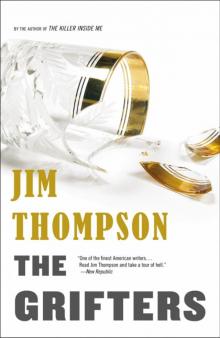 The Grifters
The Grifters The Transgressors
The Transgressors Texas by the Tail
Texas by the Tail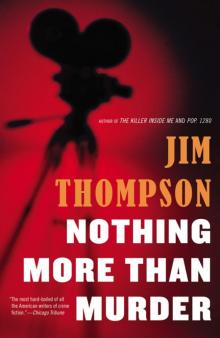 Nothing More Than Murder
Nothing More Than Murder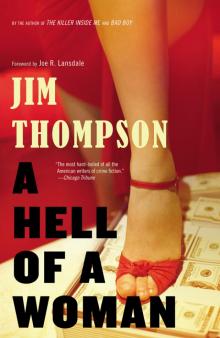 A Hell of a Woman
A Hell of a Woman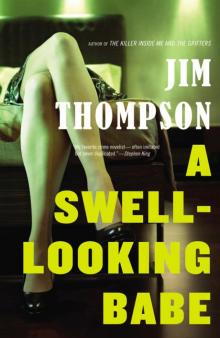 A Swell-Looking Babe
A Swell-Looking Babe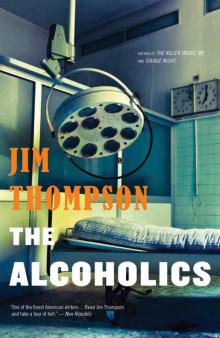 The Alcoholics
The Alcoholics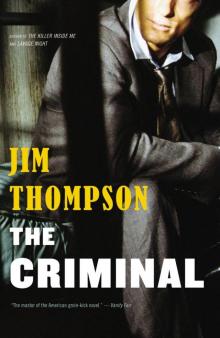 The Criminal
The Criminal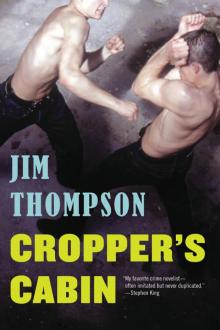 Cropper's Cabin
Cropper's Cabin South of Heaven
South of Heaven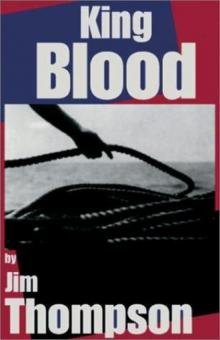 King Blood
King Blood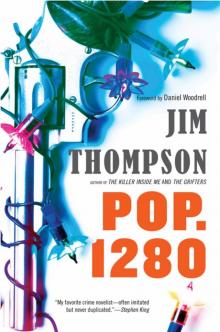 Pop. 1280
Pop. 1280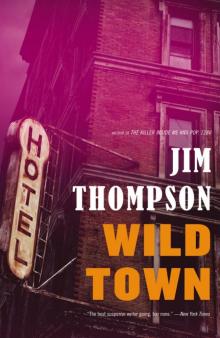 Wild Town
Wild Town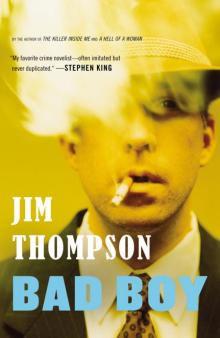 Bad Boy
Bad Boy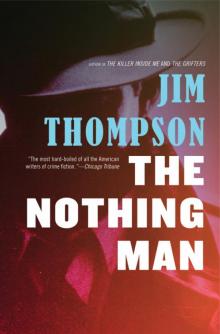 The Nothing Man
The Nothing Man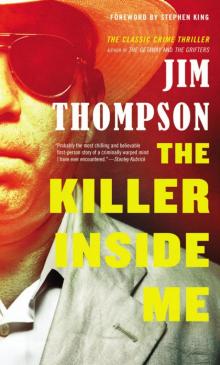 The Killer Inside Me
The Killer Inside Me Heed the Thunder
Heed the Thunder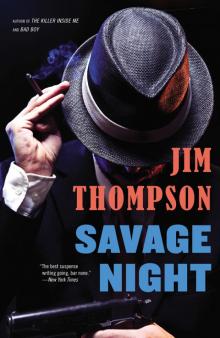 Savage Night
Savage Night Recoil
Recoil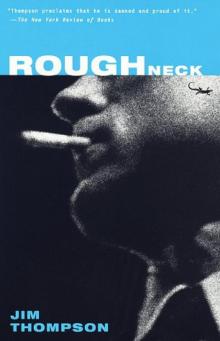 Roughneck
Roughneck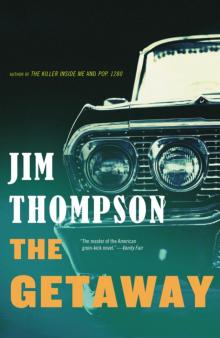 The Getaway
The Getaway